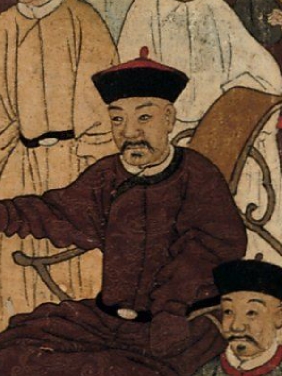
Hu Shih (Chinese: 胡適; pinyin: Hú Shì; Wade–Giles: Hu2 Shih4; 17 December 1891 – 24 February 1962), also known as Hu Suh in early references, was a Chinese diplomat, essayist and fiction writer, literary scholar, philosopher, and politician. Hu contributed to Chinese liberalism and language reform and advocated for the use of written vernacular Chinese. He participated in the May Fourth Movement and China's New Culture Movement. He was a president of Peking University. He had a wide range of interests such as literature, philosophy, history, textual criticism, and pedagogy. He was also a redology scholar.

Zheng Chenggong, Prince of Yanping, better known internationally as Koxinga, was a Southern Ming general who resisted the Qing conquest of China in the 17th century, fighting them on China's southeastern coast.

Chen ( ) is a common Chinese-language surname and one of the most common surnames in Asia. It is the most common surname in Taiwan (2010) and Singapore (2000). Chen is also the most common family name in Guangdong, Zhejiang, Fujian, Macau, and Hong Kong. It is the most common surname in Xiamen, the ancestral hometown of many overseas Hoklo.

Shih Ming-teh commonly known as Nori Shih, is a statesman and human rights defender in Taiwan and was once a political prisoner for 25-and-a-half years.

Shi Lang (1621–1696), Marquis Jinghai, also known as Secoe or Sego, was a Chinese admiral who served under the Ming and Qing dynasties in the 17th century. He was the commander-in-chief of the Qing fleets which destroyed the power of Zheng Chenggong's descendants in the 1660s, and led the conquest of the Zheng family's Kingdom of Tungning in Taiwan in 1683. Shi later governed part of Taiwan as a marquis.

The National Security Bureau is the principal intelligence agency of Taiwan.

Su Beng, born Lin Chao-hui and later known as Shih Chao-hui, was a Taiwanese political activist of Taiwan independence movement.
Shí ([ʂɻ̩̌]) or Shih is the romanization of the Chinese surname 石. It means "stone." It was one of the "Nine Sogdian Surnames." A 2013 study found it was the 63rd most common surname, shared by 4,550,000 people or 0.340% of the population, with Henan being the province with the most people. It is romanized Shek in Cantonese.

Shih Chin-tien is a Taiwanese baseball player who currently plays for Uni-President Lions of Chinese Professional Baseball League. He played as third baseman for the Lions.
Gong is the pinyin romanization of several distinct Chinese surnames, including 宫, 龔, 共, 公, 鞏, 功, 貢, and 弓. It may also be an alternative transcription of the surname Kong, or the Jyutping romanization of the Chinese surname Jiang.
Shih Chih-wei is a retired Taiwanese baseball player. He played for the amateur Taiwan Cooperative Bank baseball team before being drafted by the La New Bears of the Chinese Professional Baseball League (CPBL) in 2004.
Szeming Sze was a diplomat for his home country of China who helped build the World Health Organization into a specialized United Nations agency.

Shih Chih-ming is a Taiwanese politician of the Kuomintang party. He served two consecutive terms as mayor of Tainan City, from 1989 to 1997.
Xia is the Mandarin pinyin romanization of the Chinese surname written 夏 in Chinese character. It is romanized Hsia in Wade–Giles, and Ha in Cantonese. Xia is the 154th surname in the Song dynasty classic text Hundred Family Surnames. As of 2008, it is the 66th most common Chinese surname, shared by 3.7 million people.
Shi Shilun, popularly known as Shi Gong or Qingtian, was a much-praised Qing dynasty official during the Kangxi Emperor's reign. He was the son of general Shi Lang.
Sze Yu is a Chinese-born Australian actor, television presenter and retired badminton player.

Xu is a Chinese-language surname. In the Wade-Giles system of romanization, it is spelled as "Hsu", which is commonly used in Taiwan. It is different from Xu, represented by a different character.

Shǐ (史) is a Chinese surname meaning "history" of "official historiographer". It is romanized Shih in Wade–Giles, or Sze or Si in Cantonese romanization. According to a 2008 study, it was the 82nd most common name in China. A 2013 study found that it is shared by 2.85 million people, or 0.210% of the population, with the province with the most people being Henan. It is the 63rd name on the Hundred Family Surnames poem.
Mingde is the Mandarin Pinyin spelling of a Chinese given name.